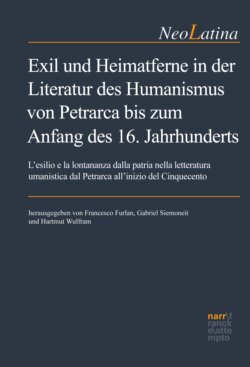Читать книгу Exil und Heimatferne in der Literatur des Humanismus von Petrarca bis zum Anfang des 16. Jahrhunderts - Группа авторов - Страница 13
Antonio Pacini
ОглавлениеConcerning Cosimo’s exile and return, the Ciceronian model is invoked by Antonio Pacini of Todi, often called Antonius Tudertinus. A translator of several of Plutarch’s Lives, Pacini dedicated two of them to the Medici brothers, Cosimo and Lorenzo. As Marianne Pade observes, Pacini’s version of the Camillus was “dedicated to Cosimo’s brother Lorenzo, but implicitly addressing also Cosimo himself, who was frequently compared to Camillus after his return from exile.”1 For Cosimo de’ Medici, Pacini translated the Timoleon sometime after 1434: for Pacini’s preface not only cites Cosimo’s contributions to the republic, but extols his triumphant return from exile.2 In the following passage, the humanist’s themes of the banker’s return (reditus), his personal esteem (dignitas), and the role of the “senate” clearly evoke Cicero’s orations Post reditum ad senatum and Post reditum ad Quirites:
Quid igitur dubii est, praestantissime Cosma, ut quemadmodum non solum in hac re publica tua, sed tota Italia consilio, auctoritate, opibus ac nominis claritate, quod apud omnes nationes celebratur, omnibus praestas, sic, si Romae aut Athenis natus fuisses, omnes egregios illos viros, Scipiones, Camillos, Fabricios ceterosque anteisses, cum divino ingenio, summa integritate summaque gravitate, omnibus virtutibus, ut uno verbo absolvam, praeditus sis et di atque homines, praeter quos livor edax excruciat, te ament, te observent. Quis dubitat nisi te hanc rem publicam in bello Lucensi tu vigilantia, consilio, prudentia tuisque opibus servavisse? Quis neget neminem nunquam fuisse, qui plus gloriae in reditu ad patriam habuerit quam tu, in qua tanta bonorum civium benivolentia, tam incredibili popularium voluntate una cum fratre tuo summo viro et singulari receptus es, tanta populari caritate? Cum iam omnes admirabili desiderio tui tenerentur atque animi augerentur, ut senatus omnes invidos omnesque, qui contra te egerant, in exilium eiecerit, necnon infinita nomina multorum, quos invidiosa illa et nepharia relegatione tua adversus te sensisse creditum est, a senatu ac magistratibus abdicata sunt atque deleta, continere non possum me quin in hoc sermone nostra versetur oratio. […] Sed nec illud quod magna admiratione dignum est praetereundum, quod nescio quomodo illis, qui contra reditum tuum contraque rem publicam arma capesserant, e manibus nullis repugnantibus arma ceciderant. Verum profecto deum immortalem hoc et cetera, quae ad te spectabant, egisse arbitror, ut pietati tuae auxilium ipse praestaret et huic rei publicae, quae iam in faucibus tyranni indies prolabebatur, prospiceret atque consuleret. At tu pro dignitate tua extra patriam vitam ducere poteras, patria autem sine te libera esse non poterat.3
(Can there be any doubt, most excellent Cosimo, that you surpass everyone, not only in this city but in all of Italy, by your judgment, authority, wealth, and by your fame that is celebrated in all nations. Indeed, if you had been born in Rome or Athens, you would have surpassed all those outstanding men – the Scipios, Camilluses, Fabricii, and others – for you possess divine wisdom, and the highest integrity and gravity – in a word, all the virtues – so that gods and men (except for those tormented by consuming envy) love and revere you. Who can doubt that only you saved our republic in the war with Lucca by your vigilance, discernment, prudence, and wealth? Who can deny that no one ever enjoyed more glory than you in returning to your country, where with your brother, an excellent and remarkable man, you were welcomed by the greatest goodwill of the best citizens, the most incredible sympathy of the masses, and the great love of the people? Everyone was gripped by such astonishing desire for you and their zeal was so heightened that the senate sent into exile all those envious men and all those who opposed you. What’s more, countless names of the masses – men known to have acted against you by that invidious and nefarious banishment – were abolished and deleted by the senate and the magistrates. Hence, I cannot contain myself in writing this discourse […]. Neither should I omit that fact most worthy of admiration, namely, that somehow those who had taken up arms against your return and the republic laid them down without any opposition. Indeed, I believe that immortal God did this and other actions on your behalf, so that he would confirm your sense of duty, and protect and sustain the republic, which was slipping daily into the tyrant’s maw. By virtue of your dignity, you could live outside your country, but without you the country could not be free).
Returning to the theme of his Plutarchan translation, Pacini adds a comment on Timoleon, who defeated the enemy and expelled the Sicilian tyrants:
Hic ille Timoleon Corinthius est, qui nobilissimam Siciliae insulam profligatis Carthaginensium copiis expulsisque omnibus tirannis in libertatem redegit […].
(This famous Timoleon from Corinth, having scattered the forces of the Carthaginians and driven out all the tyrants, restored the noble island of Sicily to freedom).4
The parallel with Cosimo is hard to miss.
